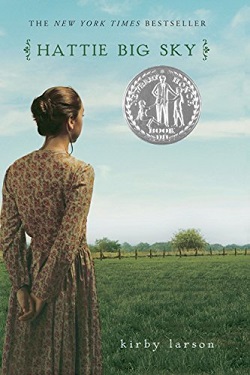 by Kirby Larson
by Kirby Larson
Conditional Recommendation: 16-year-old orphan Hattie Brooks travels to Montana to try her hand at homesteading and prove up a claim of land so that she can have a place to call home.
Awards: Newbery Medal (2007), Vermont Golden Dome Book Award (2008), Montana Book Award (2006), California Young Readers Medal for Middle School/Junior High (2009), Missouri Gateway Readers Award (2009)
Author Karen Cushman said Hattie Big Sky is “a marvelous story about courage, loyalty, perseverance, and the meaning of home,” and I couldn’t agree more. I loved the story: A young girl who has been passed from relative to relative after her parents died is given the chance to make a home of her own on a plot of land left to her by her uncle…if she has enough grit and backbone to take on the challenge. Told in first person, Hattie’s observations and introspection about herself and homestead life during the tumultuous time of WWI are authentic, humorous, and insightful. The storytelling made me laugh out loud and cry. The hardships of homesteading and the cost of war both at home and abroad aren’t sugar-coated, but the reader also sees the sweetness of friends that become like family and gumption of good people doing what’s right. It’s truly a wonderful pioneer story—one that was inspired by the author’s great-grandmother Hattie Inez Brooks and the true accounts of other Montana homesteaders.
For most of her life, sixteen-year-old Hattie Brooks has been shuttled from one distant relative to another. Tired of being Hattie Here-and-There, she summons the courage to leave Iowa and move all by herself to Vida, Montana, to prove up on her late uncle’s homestead claim. Under the big sky, Hattie braves hard weather, hard times, a cantankerous cow, and her own hopeless hand at the cookstove. Her quest to make a home is championed by new neighbors, Perilee Mueller, her German husband, and their children. For the first time in her life, Hattie feels part of a family, finding the strength to stand up against Taft Martin’s schemes to buy her out and against increasing pressure to be a “loyal” American at a time when anything—or anyone—German is suspect. Despite daily trials, Hattie continues to work her uncle’s claim until an unforeseen tragedy causes her to search her soul for the real meaning of home.
For this book, family and home reign as the dominant themes.
Prejudice and persecution – Hattie faces something completely new to her: discrimination against anyone or anything German. People are judged by where they were born and what their last name sounds like rather than who they are as a person. As I read this story in Fall 2021, I couldn’t help seeing a similar trend of current American culture which promotes seeing and judging people based on the color of their skin rather than the content of their character. People have not changed from age to age. Hattie, though initially surprised by the vehement hatred and malice, is able to see the truth in the situation and judges each person for who they are, what they say and what they do. She’s no fool, and she finds courage amidst her fears to do what she can for those unjustly persecuted.
Evil masquerading as goodness – American loyalty is the buzzword of the time of war, and unfortunately, evil things like bullying, threatening, persecution, vandalism and theft are done in the name of good. Again, not so far off from the violent, destructive rioting in American cities during the summer of 2020. Thankfully, there’s a great group of neighbors for Hattie, all who can discern the evil from the good.
There’s a decidedly Christian thread throughout the book with Hattie talking candidly to God as she goes through her days, going to the Lutheran church occasionally, and repeated phrases like “God works in mysterious ways.” Nothing too deep or dominating—just present.
The narrator’s distinct voice and way of telling her stories of homestead life are so well worded—Kirby Larson expertly wielded just the right combination of words to hit you hard, make you laugh, and completely pull you not only into the story but into the character of Hattie. Bravo!
I do love a motley crew of characters, each with their own quirks and personalities. Nobody fades into the background. Besides Hattie, her neighbor Perilee is a sensible, darling of a woman with a sturdy, hardworking husband of few words and children each unique and able to hold their own in the story and in Hattie’s heart. Another neighbor, Leafie, is a strong, plucky lady who knows her business and cares enough about others to frequently make the rounds checking in on all her neighbors. And Rooster Jim with his cooky ways and love for beating Hattie at chess makes for a thoroughly enjoyable cast. And those are just a few!
The plot took turns I did not expect, but was surprised to find they were just right for the story and satisfying all the same.
It’s a realistic, bittersweet end. But, as with all books and I love and recommend, it ends with hope.
There’s a scene where a mob of men physically and verbally attack another man for not appearing “loyal” enough by their standards. It’s a tense scene for Hattie. This book takes place when the Spanish Influenza sweeps America and many die as a result. Hattie sees it up close and personal and it’s heart wrenching.
